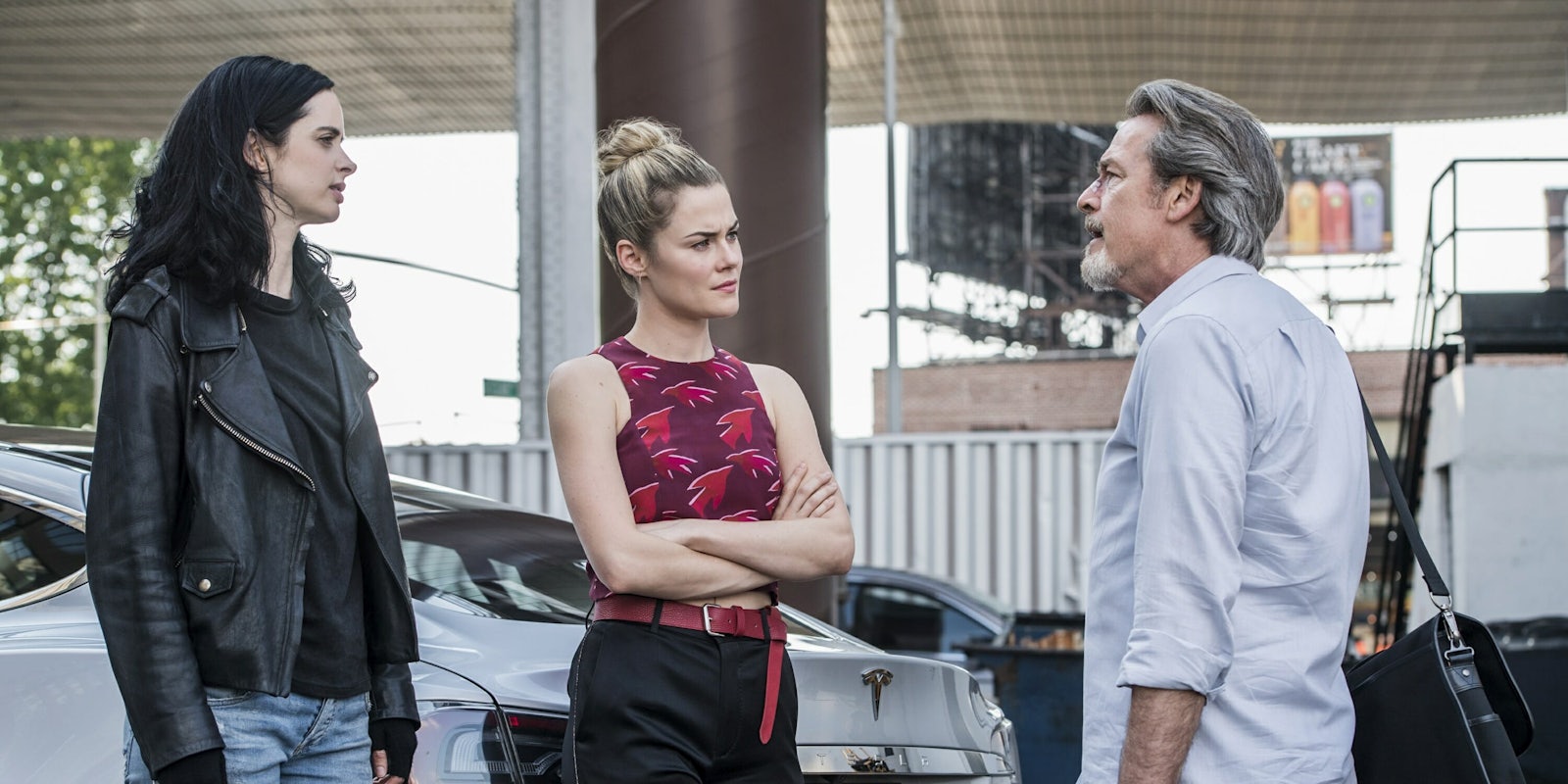Warning: This post includes spoilers for the first half of Jessica Jones season 2.
It’s hard to believe that Netflix filmed Jessica Jones season 2 before the Weinstein scandal broke. In the first few episodes, there’s a storyline that seems directly inspired by #MeToo movement, featuring an aging director who preys on young actresses. Exploring the messy reality of sexism and survival, it’s a quintessential Jessica Jones story.
At the tail end of her career as a child star, Jessica’s friend Trish had a sexual relationship with movie director Max (James McCaffrey). She was underage, and each character has a different view of what happened. As an adult, Trish recognizes what happened was abuse. Her mom thinks she overreacted, even suggesting that Trish might sleep with him again. And when Trish goes to confront Max, he shows no remorse. With a smarmy lack of respect, he makes it clear that he thought it was a consensual affair and a normal part of the casting couch process.
Sexual abuse is a common theme in female-led thrillers, often acting as the origin story for a woman’s empowerment. Jessica Jones already subverted this idea in season 1, and Trish’s revelation offers a new angle. Rather than being a defining moment in her childhood, her relationship with Max had less impact than her mom’s long-term manipulations. She obviously hates him, but when she allows him back into her life, it’s not for therapeutic reasons or revenge. It’s so she can use him to crack a case, blackmailing him in exchange for access to hospital files.
Jessica Jones doesn’t require moral purity from its women and avoids unrealistically easy resolutions to trauma. Trish and Jessica don’t bring Max to justice. In fact, that’s not even Trish’s original goal. She threatens to expose him as an abuser, meaning she’s willing to keep quiet in exchange for a favor. But Max calls her bluff, guessing that when push comes to shove, Trish won’t want to expose herself as a celebrity victim. In the end, she resolves the issue by telling a young actress in his latest movie, which hits him where it hurts: his career. Since Jessica Jones is written and directed by women, this may be inspired by real-life experiences, where women have to work together to deal with sexual harassment, knowing that the “official channels” are too high a risk.
While Kilgrave and Jessica were a powerful allegory for abusive relationships, their story was couched in a veneer of science fiction. Trish’s #MeToo storyline is more relatable because her abuser isn’t a supervillain; he’s just some guy. And while she’s angry with Max when she confronts him, she’s also characteristically self-serving. Rather than seeking justice, she wants payment in return for what she suffered. Given the option of kicking off a scandal that might (or might not) end Max’s career, she’d rather forget what happened. Of course, that act of self-preservation means Max could do the same thing to someone else. There’s no easy solution, although Trish tries to assuage her feelings of powerlessness through other means. Precipitated by her experiences last season, she begins to collect guns and use performance-enhancing drugs. But as Jessica already proved, physical strength isn’t everything. You can’t defeat rape culture by punching people.
We expect a certain formula from rape/revenge storylines. First, we see a brutal assault or its aftermath, illustrating the victim’s pain and the perpetrator’s sadism. Then the victim either exacts her own violent retribution, or a vigilante punishes the rapist on her behalf. Jessica Jones avoids anything so neat. By killing Kilgrave, Jessica removed one problem but now has to deal with the guilt of being a murderer on top of her ongoing trauma. As for Max, his role is a textbook example of how powerful men get away with abusive behavior. His career is still going strong while Trish was chewed up and spat out by the industry, and when she confronts him, he isn’t even scared. He knows he can get away with it.
This kind of material is why Jessica Jones hits closer to home than a lot of other superhero dramas. A villain like Daredevil‘s Wilson Fisk can be as well-drawn as you like, but a duel between a superhero and a mob boss can’t inspire the same visceral response as a petty creep like Max. He isn’t smart or impressive; he’s just statistically likely to get away with his crimes.


